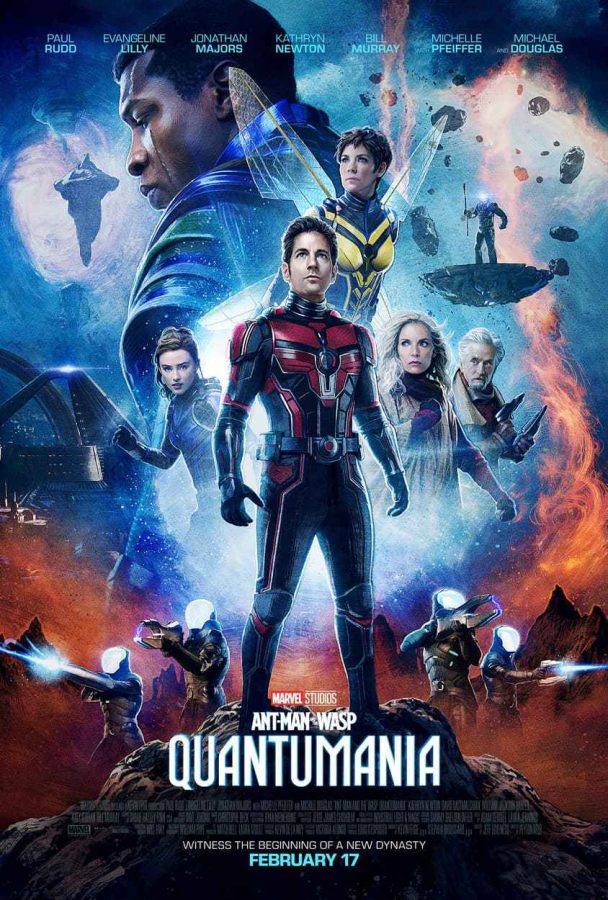Ant-Man 3 Makes a Tiny Splash
Ant-Man and the Wasp: Quantumania stars Paul Rudd as Ant-Man
March 14, 2023
Ant-Man and the Wasp: Quantumania is the third film in the Ant-Man series, and the 31st entry in the Marvel Cinematic Universe.
It doesn’t break any new ground for the MCU and hits roughly the same beats as every other Marvel flick. If you’re already a fan of the MCU, then you can’t go wrong with Ant-Man 3. If, however, the campy dialogue, thin plots, and CGI bad guys aren’t your style, you’re probably better off looking elsewhere, as Ant-Man 3 doesn’t really have much beyond that.
Following the events of Avengers: Endgame, Scott Lang (AKA Ant-Man) has been taking it easy. He’s written a memoir and has spent most of his time with his girlfriend, Hope, and his daughter, Cassie. A wrench is thrown in Scott’s easy life when his daughter creates a device capable of communicating with the ‘Quantum Realm.’ The device backfires and Scott, Hope, Cassie, and Hope’s parents are all pulled into the Quantum Realm. If they want to go home they have to confront Kang, the conquering dictator who rules the Realm, with an iron fist.
Ant-Man and the Wasp: Quantumania is two hours long, but it really doesn’t feel like it. Not because it’s edge-of-your seat exciting, but because by the end of the film it feels like nothing has really happened.
Ant-Man 3 is not boring by any measure, the film never slows down enough for it to even approach being boring. But it does feel rather empty, it’s essentially a series of CGI action set-pieces tied together with minimal plot and a near-complete lack of character development.
While MCU films aren’t exactly known for their deeper themes or layered characters, they do typically present solid stories and solid characters. Characters like Tony Stark and Steve Rogers undergo substantial character growth in their own respective films, and it’s disappointing to see that Scott Lang is not given the same treatment.
As previously mentioned, this lack of substance really affects the characters, by the end of the film the characters have not displayed any meaningful growth or change, nor are they placed in any situations which challenge or test them.
Similarly, static are the relationships between the characters, none of the bonds between the main cast are ever tested or strained in any meaningful way, and characters begin and end the film with more or less the same stable dynamics.
The driving force in any story, and the reason for the audience to be invested at all is the characters. Stories are fundamentally about characters, and when the characters are poorly written the story quickly falls apart.
What makes the emptiness of this story doubly infuriating is how little it matters in the broader context of the MCU. This film serves as a pretty lacking introduction to the new main villain, Kang. Of course Marvel is likely banking on the audience already being familiar with him from his appearance in Loki, but that’s a pretty big assumption to make, and this film does a pretty poor job of characterizing him. Kang’s motivations for his multiversal conquest aren’t really explored in this story, which is a shame because the segments with Kang are definitely the most interesting in the film.
Antman and the Wasp: Quantumania is very much the 31st film in a franchise. It fully embraces the tropes and stereotypes that the MCU has come to be known for.
The eternal engine that Marvel has created shows no signs of slowing down. The next three and a half years of Marvel content have already been planned out including nine feature films, and six TV shows.
And, while the speed and efficiency at which Marvel has produced, and will continue to produce their ‘cinematic universe’ is certainly impressive, in the process of producing so much content, the art of filmmaking is homogenized and the artistry is degraded, and Ant-Man and the Wasp: Quantumania is only the most recent example of this degradation.






